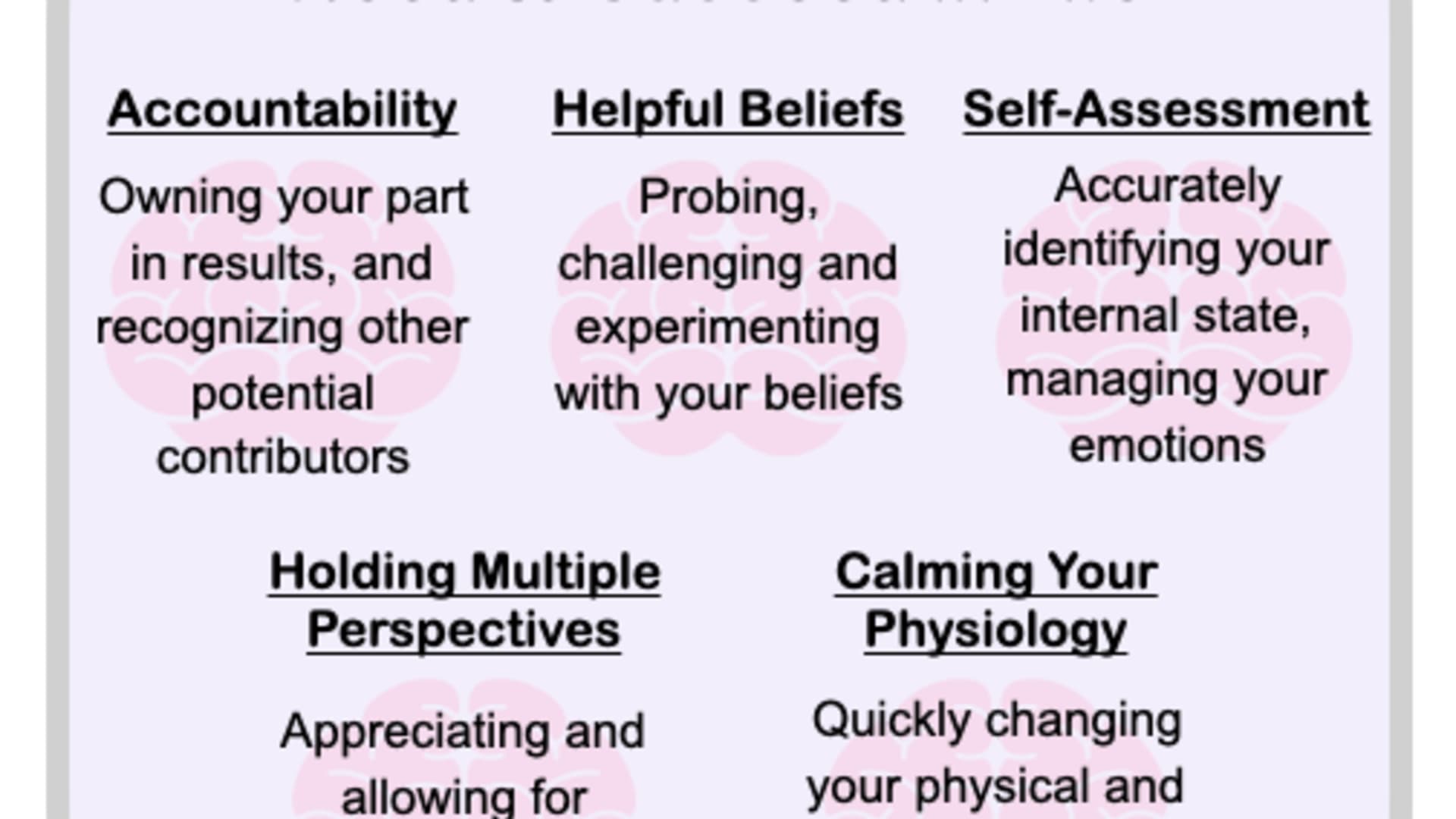
When we want to become more physically fit, we work our bodies, sometimes concentrating on specific muscles, such as our biceps or quads. We can do the same with our mental fitness.
In my 25-plus years of research as a psychotherapist, I've found that there are five main mental muscles that all work together to help us increase our emotional intelligence, respond to situations with more resilience, build stronger interpersonal relationships, and thrive in all parts of life.
While a good amount of successful people have already mastered these muscles, most people aren't there yet:
Chart: The 5 muscles of mental fitness
Get South Florida local news, weather forecasts and entertainment stories to your inbox. Sign up for NBC South Florida newsletters.

1. Accountability
You'd be surprised at how many people incorrectly think they've already mastered this one. Personal accountability doesn't have to do with everyday actions like showing up for work or taking your kids to baseball practice on time.
It functions on a much more radical level:
- You stop blaming other people and circumstances for how you feel or for what has happened.
- You fully own your part in your results, even while recognizing other potential contributors to what has unfolded.
- You own exactly what's yours and you hold others to owning what's theirs.
2. Helpful beliefs
Money Report
Most of us think that our beliefs are truths. But they are actually a set of assumptions, which means that we can experiment with them. We can probe them, challenge them and try to think of new ones.
Here are some helpful lenses to adopt:
- Collaborative lens: This is the "I win when you win" approach. Maybe everyone doesn't get everything they want, but they all walk away feeling heard and included.
- Possibility lens: This lens allows you to take a step back and temporarily set aside all perceived obstacles, problems or doubts in order to give yourself the freedom to imagine an ideal outcome.
- Opportunity lens: Even in times of conflict, you can ask yourself, "How can I find an opportunity in whatever situation I face?"
3. Self-assessment
Can you accurately self-assess your internal state? This is the running commentary in your head, the moods and emotions you feel, and the physical sensations you have, like a knot in your stomach.
Let's say you're in a really bad mood. That's vague. But if you have strong self-assessment muscles, you can say that you're experiencing a combination of disappointment, anger and anxiety and a pounding headache.
The goal is to get better at managing and regulating your emotions and responses to triggers.
4. Holding multiple perspectives
If you're like most people, you're focused on proving that your position is the right one. But when you're able to see many disparate viewpoints, you have the ability to understand and consider perspectives that aren't aligned with yours.
When you appreciate and allow for differences in opinions, you can leave a conversation without needing to establish who is right or wrong.
Move beyond the simplicity of black/white, right/wrong and either/or. Practice suspending judgment and embrace the complexity of gray, as well as the potential of the "yet-to-be-known."
5. Calming your physiology
We underestimate the immense power that we have over our physical state when we are distressed or upset in some way, and how to alter it in general.
The truth is that we can influence our own nervous systems. On the one hand, unhelpfully, we can easily intensify a catabolic state, such as "getting wound up" over something. But helpfully, we can also calm ourselves.
There are many wildly effective techniques, such as breathing exercises and muscle relaxation, that you can use to quickly change your physical state when you feel triggered or threatened.
Quiz: How mentally fit are you?
Use the quick quiz below to get a general sense of your mental strength level.
To start, read and determine which one statement below is much like you — most of the time — when you get triggered by a situation or scenario:
A. "I stay triggered." Whatever is bothering you lingers, or at some point you just move on.
B. "I can get myself out of the triggered reaction." But it takes a while, and that sense of relief doesn't last very long; your reaction comes back shortly.
C. "I get myself out of the triggered reaction within a few minutes." Not only that, but it's pretty much gone for good because you've changed the way you viewed the situation.
D. "I no longer get triggered in an upsetting scenario." You are aware of what has happened, but it is mostly a "nonevent" to you.
E. "None of the above apply to me." Either you're not sure how you handle your triggers, or you don't think you get triggered as much.
What your answer means
If you answered A, B or E:
Your mental fitness level matches most people. You're at the starting line — and that's okay! Strengthening your mental muscles takes time.
If you chose E, you're still in beginner's mode. It is likely that you're dealing with triggers using an avoidance strategy. People with strong mental fitness have a high level of self-awareness, and they know exactly what they're doing to manage their moods.
If you answered C:
It's clear you've already done some work to increase your mental fitness. You have at least a moderate level for growth.
Know that your ultimate goal is to be able to consistently shift in this way across all the different domains of your life, both personally and professionally.
If you answered D:
You've got a solid level of mental fitness. If you can hold this shift across all domains of your life, your high level of mental fitness will serve you well in challenging situations.
Jody Michael is a psychotherapist and the CEO of Jody Michael Associates, a executive coaching company. She is also the author of the bestselling book "Leading Lightly: Lower Your Stress, Think with Clarity, and Lead with Ease." Follow her on Twitter @jmacoaching.
Don't miss:
- Harvard researcher says the most emotionally intelligent people have these 12 traits. Which do you have?
- A neuroscientist shares the 6 exercises she does every day to build resilience and mental strength
- Jeff Bezos: People who are 'right a lot' make decisions differently than everyone else—here's how
- There are 3 types of employees. Here’s the rarest one—and why psychologists say they outperform everyone else
Sign up now: Get smarter about your money and career with our weekly newsletter






